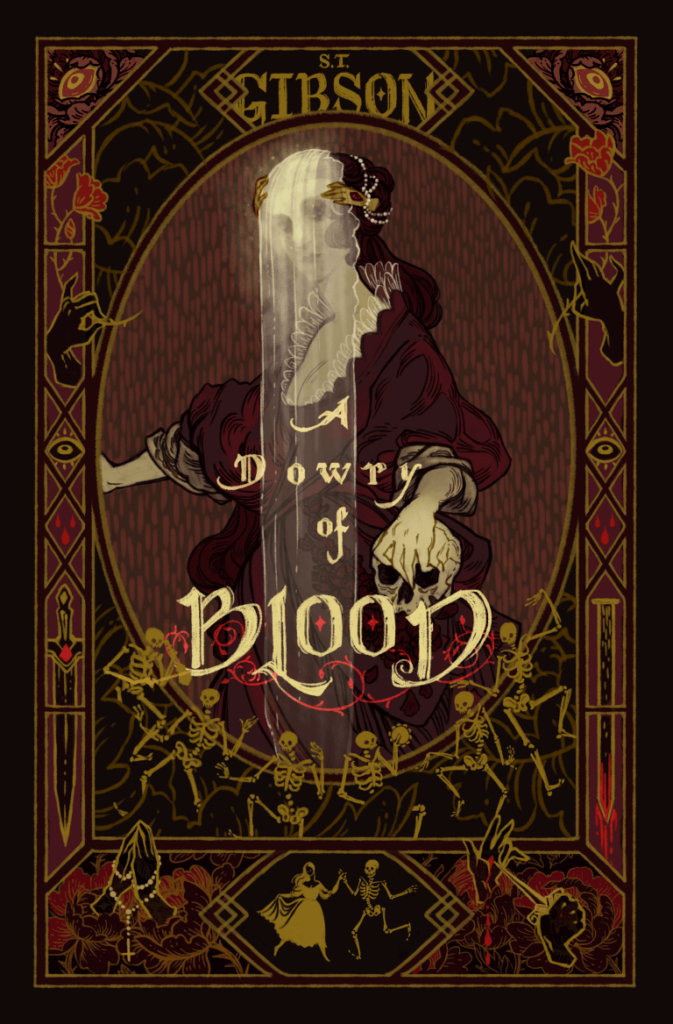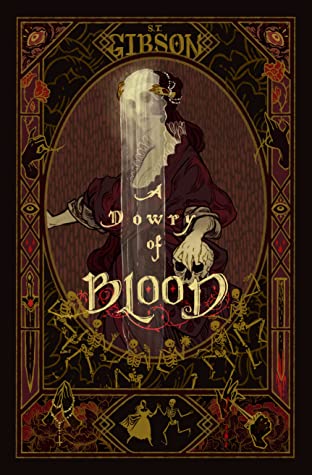
Genres: Queer Protagonists, Historical Fantasy
Representation: Bi/pansexual MC, polyamory, M/F/F/M, queer cast
Published on: 31st January 2021
Goodreads

A lyrical and dreamy reimagining of Dracula’s brides, A DOWRY OF BLOOD is a story of desire, obsession, and emancipation.
Saved from the brink of death by a mysterious stranger, Constanta is transformed from a medieval peasant into a bride fit for an undying king. But when Dracula draws a cunning aristocrat and a starving artist into his web of passion and deceit, Constanta realizes that her beloved is capable of terrible things. Finding comfort in the arms of her rival consorts, she begins to unravel their husband’s dark secrets.
With the lives of everyone she loves on the line, Constanta will have to choose between her own freedom and her love for her husband. But bonds forged by blood can only be broken by death.
I received this book for free from Nyx Publishing; this does not affect my opinion of the book or the content of my review.
Highlights
~not even a little bit Stoker’s Dracula
~vampires being hella queer
~Venetian Carnivale with your sister-wife
~pretty boys are for rescuing
~let’s be honest, we all like a little blood-play
Ornate. Delicious. Hedonistic. Bloodied and bejewelled. This isn’t a book; this is a feast.
Take a moment to savour the title. Just the title. Dowry of Blood. Doesn’t it conjure to mind rich velvets and ancient secrets, gowns and jewels and intoxicating danger? Doesn’t it make you think of lips parted as if for a kiss, or a snarl? Power, yearning, darkly delicious sensuality. Bloodstained loving and loving bloodshed.
I’m here to assure you that Dowry has all those things and more.
And yet, from the start this book subverts your expectations. To start with, Gibson has taken characters who had no voice at all – Dracula’s wives – and decided to tell their story, to give them the stage for once. So even the premise of the book flips the narrative around, bares sharp, bloody teeth at the establishment that thinks this is a man’s story.
And then, we have this–
I never dreamed it would end like this, my lord: your blood splashing hot flecks onto my nightgown and pouring in rivulets onto our bedchamber floor.
This is the first line of the book. That lord, whose name is inextricably tied to the idea of vampire, who defined the modern mythology of the monster? The great and powerful vampire prince who struck terror into generations of those who learned his story?
Oh, he’s dead.
Constanta, our narrator – her story begins where the stories of so many women have ended throughout history; beaten down in the dirt, her loved ones dead, her village afire. And when offered the choice, she chooses what women, what good girls are not supposed to choose: to become a monster rather than die quietly. She wreaks her vengeance on the men who destroyed her human life with a fiercely joyful savagery, as if she has become the avatar of female rage, acting for all the women who have ever been unable to fight back.
I wanted to break them, even more slowly and painfully than they had broken me, leave them bleeding out and begging for mercy.
It’s a powerful moment.
But Constanta doesn’t quite hold on to her power. Once her almost-murderers are dead she surrenders, happily, to the man who made her a vampire.
In that moment, my life was not my own any longer. I felt it slipping away from me the way girlhoods must slip from women who are given proper church marriages and cups of communion wine, not bruising kisses and battlefields full of blood.
And maybe that would give the book a very different feel – if we didn’t already know that she is writing this story after having murdered him.
But we do know.
So.
In this world, you are what I say you are, and I say you are a ghost, a long night’s fever dream that I have finally woken up from. I say you are the smoke-wisp memory of a flame, thawing ice suffering under an early spring sun, a chalk ledger of debts being wiped clean.
I say you do not have a name.
The story Constanta tells us paints her as someone to be pitied; a young woman who was swept up into a toxic relationship, too naive to know better. A victim. And she is a victim – or was – but reading about how her lord manipulates her, gaslights her, emotionally abuses her – all along, we know how it ends. We know she doesn’t stay this way. We know the tables are going to turn.
My lord. My liege. Beloved. King. My darling. My defender.
I had so many names for you in those days, my cup of devotion overflowing with titles worthy of your station.
But those days are over, and the reader knows it.
That knowing colours the ‘main’ story; the recounting, the record of what has passed. We can feel immense sympathy for Constanta; we can despise what her husband does to her; but we cannot see her as weak. And really, we shouldn’t need to know that she overcomes him to believe in her strength; in a perfect world, we wouldn’t attach any kind of stigma to victimhood. We would understand that surviving is strength, too. And I think that’s what Gibson manages to get across, manages to teach us without ever once putting it into words; we read Constanta’s story knowing that she will pay back everything done to her, and therefore we see her strength even during her victimhood, her abuse. On a quiet, unconscious level, we absorb the fact that being a victim does not make you weak. Because we know she survived – and survived to turn the tables.
I hope I’m putting this into words well.
This makes Dowry of Blood sound terribly depressing and grim, which misrepresents it terribly. It’s not depressing. It’s the opposite of depressing; it’s full of the hunger for life, for experiences, for living. It is jewel-tones, it is velvet, it is opera music and gloried-in sexuality and stringing the cities of the world on a string like pearls. It’s monstrous. It’s glorious.
You taught us to never feel guilty, to revel when the world demands mourning.
Dowry of Blood is not a polite, conventional vampire story. This isn’t a book where a dewy-eyed virgin makes a man out of a monster, taming and gentling him as she might a heraldic unicorn. It is not a human fantasy, the oft-repeated, slightly illicit daydream of being adored so wholly that a monster will give up monstrousness for you.
This is a fantasy for those who want to be the monster. It’s a dream for those who hunger. Every page is imbued in a rich, dark sensuality that hearkens back to an older generation of the vampire mythos – and celebrates something fanged and fierce and primal within ourselves.
“Water your mother’s flowers with their blood.”
I nodded, my breath coming shallow and hot. “Yes, my lord.”
Better essayists than I have written at length about how the myth of the vampire is all tangled up with human sexuality, and sexual freedom is definitely one of the many ways in which Gibson’s vampires are free – no longer human, no longer bound by human laws, so does Constanta’s lord encourage her to also cast off human convention. Constanta blithely tells the reader of the human lovers – at least some of whom likely didn’t survive the experience – she and her husband share over the centuries, and there’s no drama about the fact that plenty of them are women. Constanta’s queerness is treated so blithely by her own narrative that a reader who only skims could be forgiven for missing it – at least until Constanta’s husband takes another wife, one who immediately becomes wife and lover to Constanta too.
A lesser writer could easily have made a sordid mess out of all of this, or at least left the reader with the impression that the polyamory is a manifestation of the vampires’ monstrousness, not something good and decent people should ever seriously consider. But Gibson is better than that; even as other aspects of their lives break down or are made questionable, the love at the heart of the novel shines darkly and perfect. Constanta’s husband is controlling and emotionally abusive, but the love is still very real, as is the love Constanta and her sister-wife feel for each other. If the marriage breaks down, it’s not because there’s something intrinsically flawed in the idea of a polyamorous relationship; it’s because one member of it is intrinsically flawed as a person. Gibson never leaves the reader in any doubt about that.
I craved you like maidens crave the grave, the way Death burns for human touch: inconsolably, unrelentingly, aching for the annihilation in your kiss.
And as must be clear from all the quotes I’ve included in this review, Gibson’s prose is simply breathtaking. The passion and exhilaration emanates from every page like physical heat, and the joys and sorrows alike make the reader’s heart ache. I can’t imagine anyone else doing this tale justice; nor have I ever seen the complex and yet primally simple motivations and emotions and story of it all executed so well. Gibson wields her pen like a sword and runs you through with it – but oh, you’ll thank her for it.
Constanta’s story is not one of redemption, because she doesn’t need it. Instead, Dowry of Blood is a story about claiming, embracing, and celebrating your own power, your own strength. It’s about the beauty that can be found everywhere, even when things get very dark indeed. It’s about how small we can make ourselves before we break. It’s about choosing to be monstrous rather than be made less, and in that, it’s a story for so many of us.
Dowry of Blood is unique in being a story no one else would think to tell – or tell so well – but it’s also unique in who it’s being told to. This is a book for those of us who have monsters inside us; for those of us who need or want to let those monsters out… And it’s a book that is a celebration of those parts of us.
If you embrace those shadows inside you, this is the book for you. And if you are searching for a way to step out of a different kind of shadow and into your own strength, Dowry of Blood is for you too.
Or if you’re just looking for an exquisitely beautiful story about queer vampires. That’s more than reason enough to pick up this book.
Dowry of Blood releases tomorrow. Preorder your copy, drink deep, and enjoy.







Leave a Reply